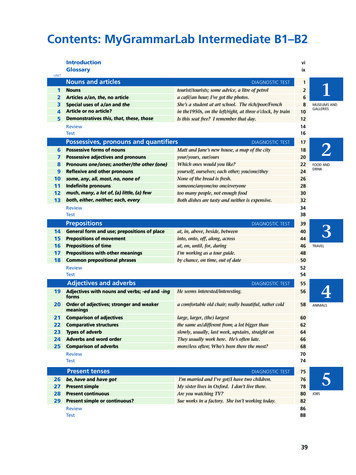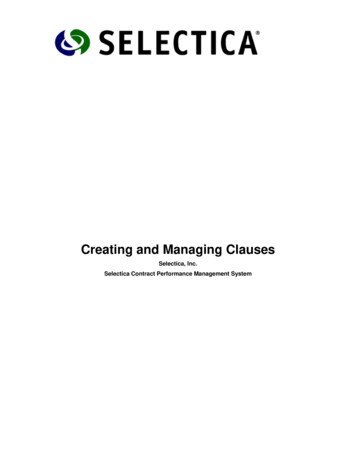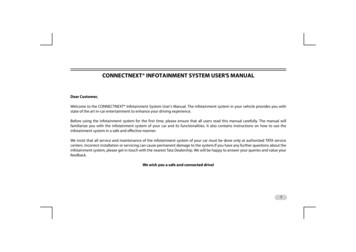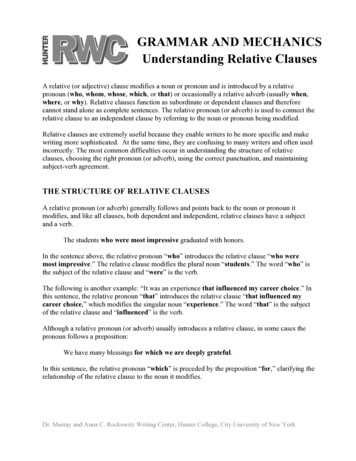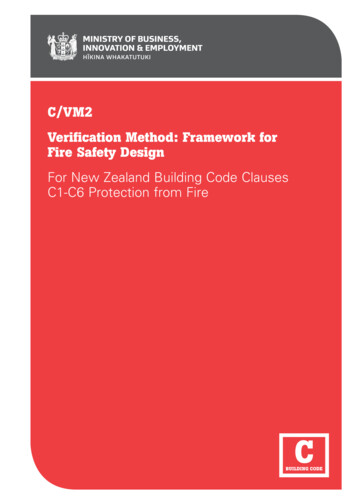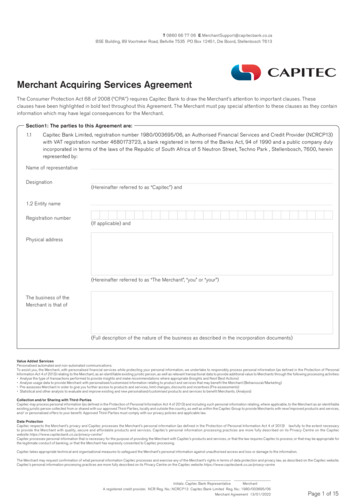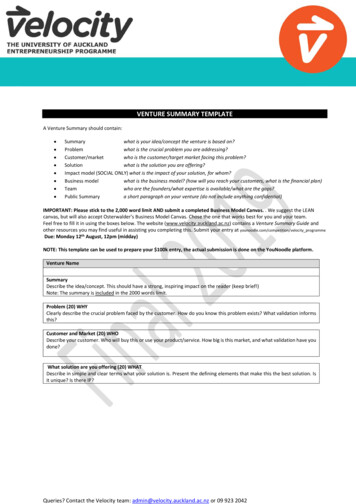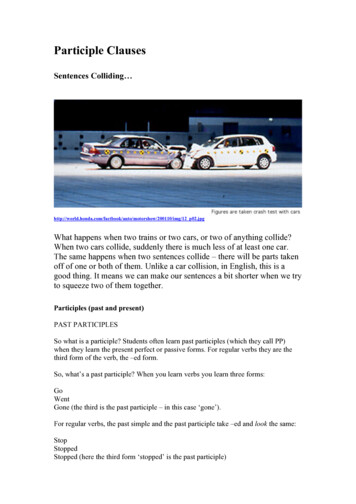
Transcription
Participle ClausesSentences Colliding 110/img/12 p02.jpgWhat happens when two trains or two cars, or two of anything collide?When two cars collide, suddenly there is much less of at least one car.The same happens when two sentences collide – there will be parts takenoff of one or both of them. Unlike a car collision, in English, this is agood thing. It means we can make our sentences a bit shorter when we tryto squeeze two of them together.Participles (past and present)PAST PARTICIPLESSo what is a participle? Students often learn past participles (which they call PP)when they learn the present perfect or passive forms. For regular verbs they are thethird form of the verb, the –ed form.So, what’s a past participle? When you learn verbs you learn three forms:GoWentGone (the third is the past participle – in this case ‘gone’).For regular verbs, the past simple and the past participle take –ed and look the same:StopStoppedStopped (here the third form ‘stopped’ is the past participle)
Irregular verbs, like with the word ‘go’ above will have a different past participle:DrinkDrankDrunk (‘drunk’ is the past participle)If you don’t know the forms of the past participle, they can easily be found ingrammar books or online. Look at the three forms and the third form (past UnderstoodStealStoleStolenWantWantedWantedLike SeeLiked SawLiked SeenWhich are regular and which are irregular?PRESENT PARTICIPLESPresent participles are much easier to deal with. They are simply the –ing form of theverb. We use them in the present continuous. They do not change and there is onlyone form to remember for regular and irregular verbs, simply add –ing.Here are some examples of verbs showing the present and past participles (note someof the spelling changes):InfinitivePresent ParticiplePast ParticipleFreezeFreezing (drop final e)FrozenStepStepping (double Eaten
The Same SubjectWhen two sentences have the same subject, we often can make one shorter sentencewith them, using a participle. Look at the examples below:1. She was hungry. She stole some bread. (Here we have two short sentences thatbelong together.)2. Because she was hungry, she stole some bread. (Here we have put them togetherwith the conjunction ‘because’, but the one sentence is longer than the two shortones.)3. Being hungry, she stole some bread. (In the third sentence we have removed thesubject and replaced the past tense verb (was) with the present participle (being).Being hungy is a participle clause.It is not always necessary to have the same subject in the two shorter sentences tomake a participle clause, but for now we will use that for the sake of being clear.Below you will find a discussion on making participle clauses without having bothsubjects the same.In the following few sections, you will see some of the situations where we findparticiple clauses.Because (reason)In the first example, (Being hungry, she stole some bread.) REASON is the situationin which we find this participle clause. We use the PRESENT PARTICIPLE for this.Here is a table with more examples. Notice that the reason part of the sentence is thepart carrying the participle clause and the conjunctions ‘so’ and ‘because’ areremoved because the participle clause now has the meaning of because (reason).Notice also that a comma is necessary between the participle clause and the remainingclause.Sentence showing reasonParticiple ClauseHe needed money, so he asked hisbrother for a loan.Because she was feeling sick, she wenthome.She was a painter, so she decided to opena gallery.They found it very hot, so they opened awindow.Because she had a test coming, she spentthe weekend studying.Needing money, he asked his brother fora loan.Feeling sick, she went home.Being a painter, she decided to open agallery.Finding it very hot, they opened awindow.Having a test coming, she spent theweekend studying.
One thing happens at the same time as anotherThere are times when two things happen at the same time in a continuous way. Sooften you can make a participle clause when there are two continuous verbs in thesentence. For example:Past .Present sitting crying She was sitting on the floor and she was crying.She was sitting on the floor, crying. (In this case crying is the entire participle clause.)Here are more examples of participle clauses made to show that two things happen atthe same time:He was walking through the park, singing his favourite song.They were looking through old pictures, laughing.The writer was looking at the scene, wondering how he would describe it.She was drinking a cup of tea, looking sadly out the window.One thing happens in the middle of anotherAs you saw in the above example, we can make a participle clause when two thingshappen at the same time. We can also make a participle clause when one thingshappens in the middle of another thing. For example: Past .burnedPresent cooking dinner He burned himself while he was cooking dinner.We can see that cooking dinner went on for some time, and that sometime during thattime, he burned himself. The cooking may have taken an hour, where he burnedhimself in one second, so it is in the middle of cooking dinner.He burned himself, cooking dinner. (‘Cooking dinner’ is the participle clause here.)Here are more examples of participle clauses that possible when one thing happens inthe middle of another thing:He was lying on the ground, waiting for the ambulance to arrive.She was biting her fingernails, waiting for the result of her audition.The student was sitting in his room, surfing the internet.The guitarist was strumming a song, making up the words.
Replacement of a relative clause (present or past participle)A relative clause is another kind of clause (using who, that, which, etc.) Often in arelative clause you can see the present continuous. When both clauses have the samesubject, you can make the relative clause into a participle clause.The man who is smoking near the door is my doctor.You can see two complete clauses here:1. The man is my doctor.2. who (the man) is smoking near the door.Since the relative clause is in the present perfect (with a present participle – smoking),it can be changed to a participle clause:The man smoking near the door is my doctor. (The participle clause here is‘smoking near the door’).Passive meaning (past participle)In a relative clause there can also be a past participle and we can make a participleclause from that, as we did with the present participle in the above example.The man who was killed in the war was the president’s brother.You can see two complete clauses here:1. The man was the president’s brother.2. who (the man) was killed in the war.The participle here is the past participle since it is used here in the passive. It ischanged to the following participle clause:The man killed in the war was the president’s brother. (The participle clause here iskilled in the war.)NOTE: Having a past participle does not always mean you can make a participleclause. This does NOT work with the perfect (present perfect or past perfect). Thisworks with the passive because of the presence of BE, which is why it also works forthe present continuous in a relative clause.Here are more examples:The money lost in the taxi cannot be found.The artist called the father of modern art is Pablo Picasso.The concert seen at the auditorium was the best of the year.
Past with Participle ClausesThere are times when you need to express that something happened in the past, andthis can be done with participle clauses too. This is done with the perfect participle(having done, having gone, having seen ).So, if you want to say “Because she had finished her homework, she went out,” youcan make a participle clause: Having finished her homework, she went out. Here aremore examples of participle clauses in the past time:Having said that, I would still like to follow my original plan.Having considered all his options, he chose to study computer science.Having been to London three times, they decided to go to Paris instead.Having finished her degree at Oxford, she went on to fame and fortune.Participle clauses when the subjects are different or impliedUp to now, our discussion on participle clauses has focused on sentences that have thesame subject in both clauses. However, it is possible to have two different subjectsand still have the participle clause clear and easy to understand. Below are somesituations where you can find this.Her brother wanting a good meal, she cooked a large dinner at home.(In this sentence ‘her’ lets us know there is a connection.)All of his paintings were popular, one having been sold for 1million.(In this sentence the pronoun ‘one’ shows us the connection to ‘his paintings’ in thefirst clause.)Millions of people suffered in the war, many losing entire families.(As with the last example, a pronoun has made a connection to the first subject –many of the millions of people.)Uses of participle clausesThere are many uses for participle clauses. See examples of their uses below.EconomyThe first use that comes to mind is language economy, saving space in a sentence.This is important when you need to reduce the number of words. This is also a way tomake sentences flow smoothly and to remove conjunctions, as well as to removesubjects that are repeated.
ItinerariesThere are text types (kinds of writing) where participle clauses are used more. Oneexample is travel itineraries (the ones where the days events are planned out for you.Look at this segment of an itinerary.DAY 4You will leave for Paris, having seen the sights of London and Edinburgh. Taking aferry to Calais, you will enjoy the sea air aboard our special “Sea Cruiser”. Arrivingin Paris, you will see the old lady of Paris, the Eiffel Tower dominating the Parisiansky. You will spend the day traveling Paris, sightseeing and taking in all the wondersof Europe’s most famous city, called the city of love.EXERCISE A:Can you identify the participle clauses in the above itinerary? Say where they fit intothe discussion above.NarrativesIt is also common to see participle clauses in narratives, as writers may want to makesome connections between clauses or show that things are happening at the same timeor in the middle of something else (see the explanation of time and participle clausesabove).EXERCISE B:Read the paragraph below and identify the participle clauses.She ran from the house crying, waving her arms and screaming for help. Theneighbours knew what was happening, having seen the signs many times andexpecting the worst. None, however, helped her, knowing that to try and protect hermeant their own suffering or death. She had made a tragic mistake marrying thatmonster, but needing security, she fell for his trap. Now, desperately running awayfrom her own reality, she has nowhere left to run.Formality (see register/stylistics)Participle clauses can be found in formal English texts. See the chapter on Registerand Sylistics for more information. They are used to make the register of languagehigher. Below are some examples:Heeding the call of the people, the king quickly signed the decree.Driven by a passion for nature, the group would use any means to stop globalwarming.Her hand shivering with fear, she held the car steady over the icy roads.
EXERCISE C:Make participle clauses from these sentences.1. She went to Bali because she needed some rest and relaxation.2. Because they were intending to buy a new house, they looked through thenewspapers every day.3. She was eating potato chips while she was watching a movie.4. He had been previously married so he had no interest in marrying again sosoon.5. She ran over a dog when she was driving to work.ANSWER KEY:Exercise AYou will leave for Paris, having seen the sights of London and Edinburgh (result with past meaning).Taking a ferry to Calais, (two things happening at the same time) you will enjoy the sea air aboard ourspecial “Sea Cruiser”. Arriving in Paris, (two things happening at the same time) you will see the oldlady of Paris, the Eiffel Tower dominating the Parisian sky (taken from a relative clause). You willspend the day traveling Paris, sightseeing and taking in all the wonders (two things happening at thesame time) of Europe’s most famous city, called the city of love (taken from a relative clause).Exercise BShe ran from the house crying, waving her arms and screaming for help. The neighbours knew whatwas happening, having seen the signs many times and expecting the worst. None, however, helpedher, knowing that to try and protect her meant their own suffering or death. She had made a tragicmistake marrying that monster, but needing security, she fell for his trap. Now, desperately runningaway from her own reality, she had nowhere left to run.Exercise C1.She went to Bali because she needed some rest and relaxation.Needing some rest and relaxation, she went to Bali.2.Because they were intending to buy a new house, they looked through the newspapers everyday.Intending to buy a new house, they looked through the newspapers everyday.3.She was eating potato chips while she was watching a movie.She was watching a movie, eating potato chips.4.He had been previously married so he had no interest in marrying again so soon.Having been previously married, he had no interest in marrying again so soon.5.She ran over a dog when she was driving to work.She ran over a dog driving to work.
In the first example, (Being hungry, she stole some bread.) REASON is the situation in which we find this participle clause. We use the PRESENT PARTICIPLE for this. Here is a table with more examples. Notice that the reason part of the sentence is the part carrying the participle clause and the conjunctions 'so' and 'because' are
